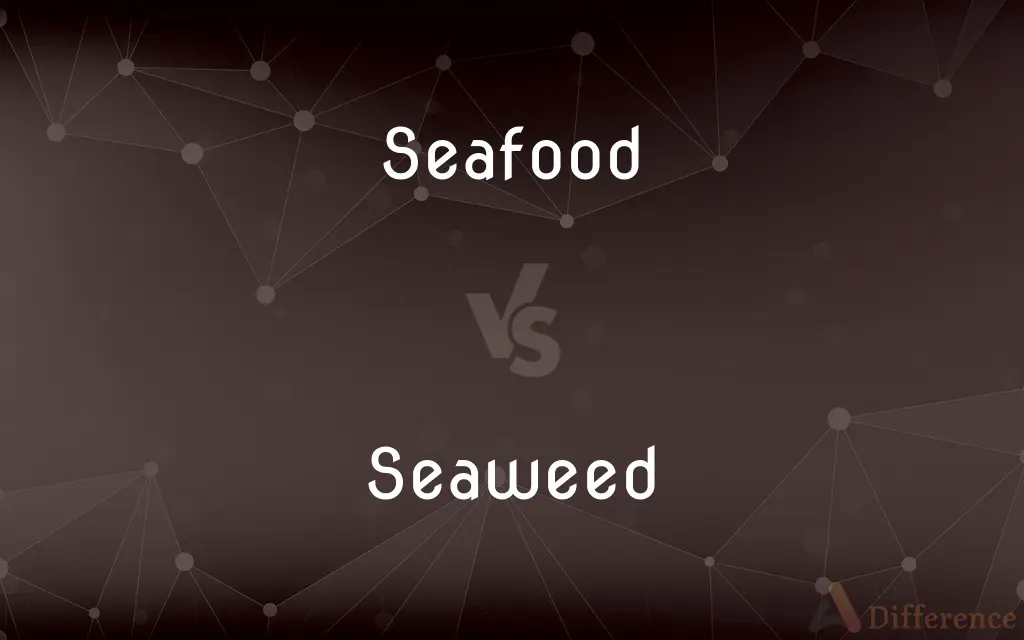Seafood vs. Seaweed — What's the Difference?
Edited by Tayyaba Rehman — By Fiza Rafique — Updated on October 27, 2023
Seafood refers to fish and shellfish consumed as food, while Seaweed is marine algae, often used in food or as a byproduct.

Difference Between Seafood and Seaweed
Table of Contents
ADVERTISEMENT
Key Differences
Seafood encompasses various marine animals, like fish and shellfish, that are consumed by humans. These can range from common varieties such as salmon or shrimp to more exotic offerings like octopus or clams. Contrarily, Seaweed refers to various forms of marine algae.
Unlike Seafood, which is sought primarily for its taste and nutritional value, Seaweed can serve multiple purposes. While it's consumed in dishes like sushi, Seaweed also plays a role in producing certain food additives and cosmetics. In comparing the two, Seafood is distinctly animal-based, while Seaweed is a form of marine plant life.
While both come from the sea, Seafood is often the centerpiece of a dish, whereas Seaweed might be an ingredient or garnish. Lastly, sustainability concerns surround both Seafood and Seaweed, but the concerns vary. Overfishing affects Seafood populations, while Seaweed farming can sometimes impact local ecosystems.
Comparison Chart
Biological Classification
Marine animals
Marine algae
Common Uses
Consumed as main dishes
Consumed, used in cosmetics, food additives
ADVERTISEMENT
Nutritional Profile
Rich in proteins, omega-3
High in minerals, vitamins, fiber
Sustainability Concerns
Overfishing, habitat damage
Impact on local marine ecosystems
Culinary Examples
Salmon, shrimp, oysters
Nori, wakame, kelp
Compare with Definitions
Seafood
Marine animals consumed as food.
The restaurant specializes in fresh Seafood dishes.
Seaweed
Can be consumed directly or processed.
Sushi rolls are often wrapped in a sheet of Seaweed called nori.
Seafood
Includes fish, mollusks, and crustaceans.
Seafood lovers often enjoy a diverse platter of clams, shrimp, and fish.
Seaweed
Marine algae that grows in the sea.
Seaweed can be seen floating near the shoreline.
Seafood
A source of protein and omega-3 fatty acids.
Incorporating Seafood into one's diet can have health benefits.
Seaweed
Rich in vitamins and minerals.
Seaweed salads are not just tasty but also nutritionally beneficial.
Seafood
Often the focus of culinary dishes.
Seafood paella showcases a medley of marine flavors.
Seaweed
Forms the base of the marine food chain.
Without Seaweed, many marine creatures would lack a primary food source.
Seafood
Harvested from the sea or freshwater sources.
Freshwater Seafood options include catfish and trout.
Seaweed
Used both as food and in industry.
The thickening agent in ice cream often comes from Seaweed.
Seafood
Seafood is any form of sea life regarded as food by humans, prominently including fish and shellfish. Shellfish include various species of molluscs (e.g.
Seaweed
Seaweed, or macroalgae, refers to thousands of species of macroscopic, multicellular, marine algae. The term includes some types of Rhodophyta (red), Phaeophyta (brown) and Chlorophyta (green) macroalgae.
Seafood
Shellfish and sea fish, served as food
A seafood restaurant
Local seafood
Seaweed
Large algae growing in the sea or on rocks below the high-water mark
Seaweed glistened on the rocks
Seaweeds abound on most shores
Seafood
Edible fish or shellfish from the sea.
Seaweed
Any of numerous marine algae, such as a kelp, rockweed, or gulfweed.
Seafood
Fish, shellfish, seaweed, and other edible aquatic life.
Seaweed
A mass of such algae.
Seafood
Edible fish (broadly including freshwater fish) or shellfish or roe etc
Seaweed
Any of numerous marine plants and algae, such as a kelp.
Seaweed
(by extension) Any of various fresh water plants and algae.
Seaweed
Popularly, any plant or plants growing in the sea.
Seaweed
Any marine plant of the class Algæ, as kelp, dulse, Fucus, Ulva, etc.
Seaweed
Plant growing in the sea, especially marine algae
Common Curiosities
Are all types of Seafood safe to eat?
While many Seafoods are safe, some can contain toxins or pollutants and should be consumed with caution.
Is Seaweed a plant or an animal?
Seaweed is a type of marine algae, so it's considered a plant-like organism.
What types of animals are considered Seafood?
Seafood includes fish, mollusks, crustaceans, and other marine animals consumed as food.
Are all types of Seaweed edible?
While many types of Seaweed are edible, not all are palatable or traditionally consumed.
Is farmed Seafood sustainable?
Some Seafood farming practices are sustainable, but it varies depending on species and methods.
What are some culinary uses of Seaweed?
Seaweed can be eaten raw, cooked, or as a wrapping in sushi rolls.
Can Seaweed be found in non-food products?
Yes, Seaweed derivatives are found in cosmetics, medicines, and food additives.
Do Seaweeds have roots like terrestrial plants?
Seaweeds have holdfasts, which anchor them but don't absorb nutrients like true roots.
How is Seafood typically prepared?
Seafood can be grilled, fried, steamed, baked, or consumed raw.
What nutrients are abundant in Seaweed?
Seaweed is rich in vitamins, minerals, fiber, and antioxidants.
How does Seaweed benefit marine ecosystems?
Seaweed provides habitat, reduces ocean acidification, and forms the base of the marine food chain.
Is Seafood consumption beneficial for health?
Many Seafoods are rich in nutrients, but it's essential to be aware of sources and potential contaminants.
Is Seafood considered meat?
While Seafood is animal-based, it's typically differentiated from land-based meats in dietary contexts.
Which is more prevalent in sushi: Seafood or Seaweed?
Both are prevalent; Seafood is often the filling, while Seaweed (nori) is commonly the wrap.
How does one store fresh Seafood?
Fresh Seafood should be refrigerated and consumed quickly or frozen for longer storage.
Share Your Discovery

Previous Comparison
Guts vs. Nuts
Next Comparison
Admire vs. AdoreAuthor Spotlight
Written by
Fiza RafiqueFiza Rafique is a skilled content writer at AskDifference.com, where she meticulously refines and enhances written pieces. Drawing from her vast editorial expertise, Fiza ensures clarity, accuracy, and precision in every article. Passionate about language, she continually seeks to elevate the quality of content for readers worldwide.
Edited by
Tayyaba RehmanTayyaba Rehman is a distinguished writer, currently serving as a primary contributor to askdifference.com. As a researcher in semantics and etymology, Tayyaba's passion for the complexity of languages and their distinctions has found a perfect home on the platform. Tayyaba delves into the intricacies of language, distinguishing between commonly confused words and phrases, thereby providing clarity for readers worldwide.
















































